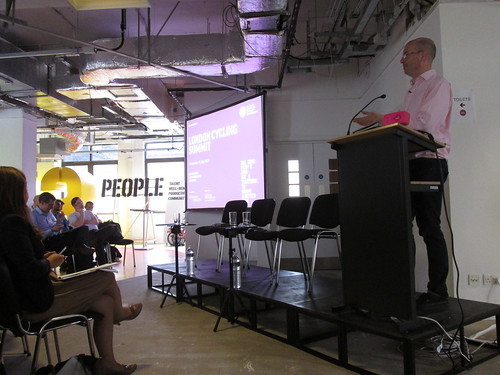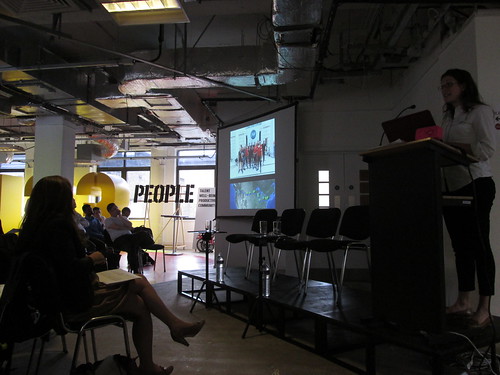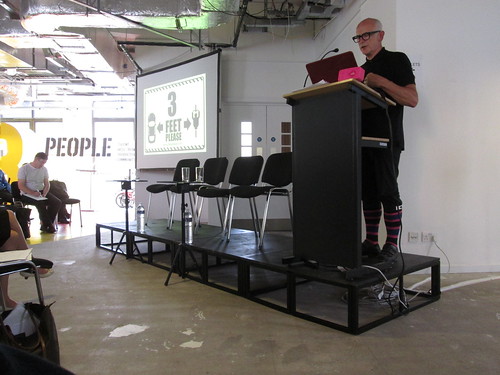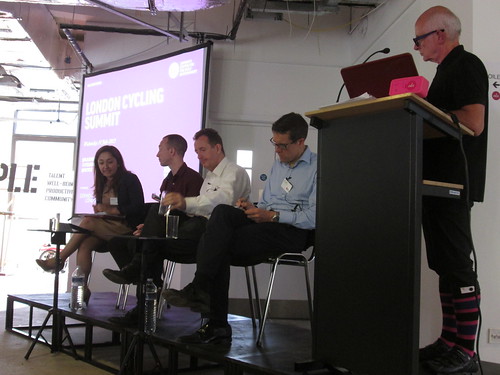Obviously my premier interest was the presentation of our preliminary findings from the P2P ride. At an earlier stage it had been hoped to have a first publication available by now. But with over 10,000 words of commentary from the internal Survey Monkey, many pages of notes form the various meetings, hours of footage of interviews and goodness knows how many gigabytes of pictures, disseminating it all has become more than a two week turnaround job.
But enough of my woes, it's all coming together, and events like yesterday help remind me that it's going to be a nice piece of work to have been involved in. The summit was sold out and seemed to be quite a variety of delegates, being hosted by the NLA it had some lots of property people, there were a few enthusiastic cycling advocates, and quite a lot of representation from the local and London government representatives.
Andrew Gilligan was the keynote speaker, he essentially talked through the mayors vision for cycling. Headline stuff I picked out of it was stuff like of the £913m budget every penny is protected. Hoping not to create expectations beyond what is in the vision, everything will not be perfect, as there are well know constraints of space etc. Things need to be done adequately or not at all. And the job of persuading councils of the need for work to be done on their roads as 95% of London's roads are owned by the boroughs rather than TfL. All in all he came across as very focussed and keen, but also pragmatic, so that's a good thing, huh?

Also the cycling commissioner spoke about the "All consuming Emphasis on safety" which I think is a very interesting point. It's hard to brush off deaths on bikes, but then... people die all the time, keeping running any agenda with the "if it bleeds it leads" mantra isn't really terribly helpful, it means people react in a very basic way, creates more fear than understanding and therefore can end up being counter productive for the whole cycling advocacy movement, or indeed any movement.
Andrew Gilligan was followed by Ben Plowden of TfL. He spoke about the delivery of the vision and again was quite pragmatic but positive. Sarah did a grand job introducing the Portland to Portland ride and the challenges of the day to day stuff and mixingthat with the business of research too which Peter expanded upon.

Peter's talk I was reasonably well versed with, what with having been on the ride and all, but always good to have these little reminders, and being so deep in my own point of view of the stuff we saw one of the big advantages of our ride was all the different points of view from other professionals with such depth of knowledge in place making. There is also an interview with Peter on the London Cycling Campaign website that covers a lot of the themes of our findings.

There was a Q&A session on borough strategies represented by Hackney, Camden and Ealing. They all sounded very positive about cycling issues where a large part of the issue the TfL have is persuading the boroughs to buy into the cycling vision,and hopefully exceed it, but it sounded like they were all trying to sell something (isn't everyone) or competing with each other, but good to see that there is representation.

Place making is a theme that came up in relation to cycling all through the summit, and indeed through our ride. Nick Searl of Argent explained the role it takes in King's Cross, and the fact that a single development can't change the city, but there is much more demand from tenants now for the standard of facilities for cycling to be way in excess of what would have been required in the last 5 or 10 years, so the market is leading the need to make cycling more accessible. Also of course the role that incorporating cycling and placemaking, or looking more holistically at how a place is designed as well as how people get around and interact with the different areas. But then what do we know about placemaking or anything else?
Joylon Brewis of P2P friends Grimshaw Architects Talk started with stating all the benefits of cycling, I was about to make a note about don't we all know this already, is there any need to state these in our report as they are so widely available and largely uncontested now (you know, health, fitness, liveability etc etc) but then he pointed out that you do need to point out the benefits to all because it costs to pay for the improvements, the pay back may not always be tangible, but there is money to be made somewhere, and that is how things get done.
The ideas that stuck in my head the most about this talk was the idea of making sure cycling was seen, and branded as another part of the transportation network. So using roundels, making sure there is consistency in signage across the network, but then the idea of having a cycling network is what needs to be ingrained into the system. A lot of it can be done relatively cheaply, and some of it can be made to pay for itself. Though of course there is always the question of getting cyclists to pay for anything (like parking) as the mindset is that it's all free when you ride, so need to see where the value is.
I had been interested in the views of the advocacy groups, represented by German Dector-Vega of Sustrans whose presentation was entertaining, but I felt really preaching to the converted. Then Tom Bogdanowicz who was presenting on the role of advocacy grups I felt came across as what one of the differences with advocacy in London being more adversarial than that which we found in the states. People like Jonathan Maus of bikeportland, and the guys from the ATA or Bike Pittsburgh seemed to have moved into a kind of more collaborative or ingrained way of working with the cities. Maybe this was just my point of view at the time, or the way that they presented themselves, and I suppose it goes with the fact that cycling in London is more combative, so maybe the sides line up more aggressively off court. In the 3 weeks or so that I've been back in London and riding round the city, as well as out to Brighton or Hampshire I've been in more close shaves, aggressive driving or negligent driving incidnts than in the whole 2 and a half months in the states, in fact I probably had as many incidents yesterday alone on a ride out to visit friends in Basingstoke, 3 cars overtake to immediatly turn left across me, and about 3 instances of passing way too close, way too fast.
One question that i recall now from the Q&A was why can't we do what NY did and literally turn stuff around overnight, kind of gurilla bike lanes just by adding planters and paint. Which would be interesting, but it is harder here, what with the limitations on space and the know on effects for the rest of the road network, but also the amount of different stakeholders in who owns the road space.
An interesting day, a few more notes to feed into the output from the research, and was good to have a little P2P reunion after, though felt at a bit of a loss at the end of dinner, thoughtlessly saying 'see you in the morning' recalling our days on the road.
The writer is enthusiastic about purchasing wooden furniture on the web and his exploration about best wooden furniture has brought about the arrangement of this article. how to train a german sheperd
ReplyDelete